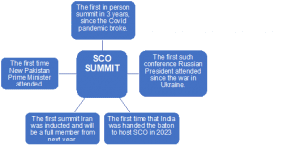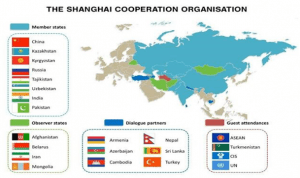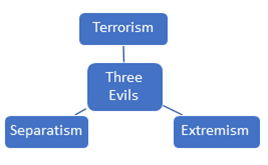THE CONTEXT: The 22nd edition of the Council of Heads of the Shanghai Cooperation Organization Member States (SCO-CHS) concluded with India taking over chair of the regional forum. In this article, we will analyse the background of SCO, What are the bilateral and Multilateral challenges faced by the countries, highlights of the Indian Prime Minister’s speech, and the most importantly, the outcomes and the way forward.
THE OUTCOMES SAMARKAND DECLARATION
Decision by the Council of Heads of the SCO Member States on the Comprehensive Action Plan for 2023-2027 for implementation of provisions of the Treaty on Long-Term Good Neighbourliness, Friendship and Cooperation among the Shanghai Cooperation Organization Member States and also to Develop Interconnectivity and Create Efficient Transport Corridors and “smart” agriculture and agro- innovation.
- The Samarkand declaration advocated “commitment to peaceful settlement of differences and disputes between countries through dialogue and consultation”.
- The rotational presidency of the Shanghai Cooperation Organization has been handed over to India. New Delhi will hold the presidency of the grouping for a year until September 2023.
- Member States on signing the Memorandum of Commitment of the Islamic Republic of Iran to become a member State of the Shanghai Cooperation Organization.
- Member States on launching the procedure of admitting the Republic of Belarus as a member, granting the Republic of the Union of Myanmar and United Arab Emirates, Kuwait, Maldives the status of Shanghai Cooperation Organization dialogue partner.
- The SCO plans to prepare a single list of terrorist, separatist and extremist groups whose activities are banned on the territories of the member states. This move aims to counter the threat posed by them to the region.
- Member States on declaring Varanasi, Republic of India, as the Tourist and Cultural Capital of the Shanghai Cooperation Organization in 2022-2023.
- India once again refrained from affirming support for China’s One Belt, One Road (OBOR) initiative in the Joint Declaration.
- Member States on the approval of the Report of the Council of the Shanghai Cooperation Organization Regional Anti-Terrorism Structure on the activities of the Shanghai Cooperation Organization Regional Anti-Terrorism Structure in 2021.
HIGHLIGHTS OF INDIAN PRIME MINSTER SPEECH DURING THE SUMMIT
- Indian Prime Minister urged the world leaders present at the Shanghai Cooperation Organisation (SCO) summit 2022 to work towards solving the supply chain issues that were caused by the COVID-19 pandemic and the ongoing crisis in Ukraine. The United Nations had previously expressed concerns about the food and energy crisis that has been plaguing a number of countries.
- Addressing the summit, Indian Prime Minister framed the “right to transit” in the context of connectivity and how it could help establish reliable and resilient supply chains in the region. Lack of transit across Pakistan’s territory has been a challenge for India to access Central Asian markets, and Delhi has flagged this concern several times in the past.
- The Indian Prime Minister also took the opportunity to talk about how the Indian economy has bounced back after the pandemic and the growth expected in the near future. “We are focussing on people-centric development model. We are supporting innovation in every sector. Today there are more than 70,000 start-ups and over 100 unicorns in our country.”
BILATERAL MEETING WITH IRAN
- During the meeting, the two leaders discussed many important issues pertaining to the bilateral relationship and expressed their desire for strengthening the relationship further. Prime Minister highlighted that India- Iran bilateral ties are marked by historic and civilizational connections, including strong people to people contacts.
- The two leaders reviewed the progress in the development of the Shahid Beheshti terminal,Chabahar Port and underscored the importance of bilateral cooperation in the field of regional connectivity.
- They also discussed international and regional developments including Afghanistan. Prime Minister reiterated India’s priorities of providing humanitarian assistance to the people of Afghanistan and the need for a representative and inclusive political dispensation in support of a peaceful, stable and secure Afghanistan.
- President Raisi briefed the Prime Minister on the status of the JCPOA negotiations.
BILATERAL MEETING WITH RUSSIAN PRESIDENT
- Indian Prime Minister began his comments by telling the Russian President that the “era of war” is over, indicating India’s discomfort with Russia’s attack on Ukraine for the first time in public, although New Delhi has not criticised Russia for its action thus far. He reiterated his call for an early cessation of hostilities and the need for dialogue and diplomacy.
- The two leaders also had a discussion pertaining to global food security, energy security and availability of fertilizers in the context of the challenges emanating from the current geopolitical situation.
HOW DOES MEMBERSHIP OF THE SCO HELP INDIA?
FOR ECONOMIC POTENTIAL
- India’s membership provides it with select opportunities in the geoeconomic and the geostrategic sphere in the Central Asian Region (CAR). The CAR supplies around 10 percent of oil and energy to the world. With India being one of the most energy-hungry nations, involvement in the SCO provides it with an opportunity to satisfy its energy requirements through regional diplomacy.
- India’s pending energy projects like the TAPI (Turkmenistan-Afghanistan-Pakistan-India) pipeline, IPI (Iran-Pakistan-India) pipeline, and CASA (Central Asia-South Asia)-1000 electricity transmission projects — all of which are blocked, due in part to Pakistan’s recalcitrant approach — can get a much-needed push through the SCO.
FOR SECURITY
- In the sphere of security, the SCO formed Regional Anti-Terrorism Structure (RATS) in 2005 at Tashkent. RATS which works on information sharing and joint counterterrorism measures between member states. The SCO has successfully nullified 600 would-be attacks and extradited more than 500 terrorists through the RATS mechanism. India’s full membership in the SCO will enable it to play an instrumental role in RATS.
FOR INDIA-PAKISTAN AND INDIA-CHINA RELATIONSHIP
- In the absence of the SAARC summit, the SCO summit gives an opportunity for Indian and Pakistani leaders to meet informally, on the side-lines. Both sides have the obligation not to bring in bilateral disputes but can cooperate on issues of mutual interest and importance.
- China, Pakistan and Russia are already in talks with the Taliban, India can volunteer to work upon a stable solution for crisis at Afghanistan crisis, much needed for peace in the region.
- Signing off on joint counter-terrorism exercises will be a new form of engagement between the two militaries. With China, it is yet another opening, like the BRICS summit last year (2021), to bring down tensions, and ahead of the next informal summit in October in India.
FOR GLOBAL GEOPOLITICS
- The US’ power struggle with China, exit from the Iran nuclear deal Joint Comprehensive Plan of Action (JCPOA) (affects India’s oil imports from Iran), and adversarial attitude towards Russia (affects India’s defence purchase like S-400) have forced India to choose sides. While Washington’s stance against Islamabad after the Pulwama attack was evidence of its support to New Delhi, India has had a strained relationship with China after the Doklam stand-off, followed by attempts to reset relations in Wuhan.
- In the SCO, India’s sitting down with less-than-free regimes, Russia and China has always had the West worried. India, however, has always been tactful in not aligning with these countries on governance issues. What draws India to SCO is the “Shanghai spirit”, which emphasises harmony, non-interference in others’ internal affairs, and non-alignment. The bottom line is that it helps India keep all options open in terms of international partnerships.
POINT TO BE NOTED
- India’s bilateral trade with Central Asia stands at about $2 billion and with Russia about $10 billion in 2017.
- In contrast, China’s trade with Russia has crossed $100 billion in 2018 while the bilateral figures for Central Asia stand at over $50 billion.
WHAT’S THE DOWNSIDE WITH THE SCO?
THE COUNTER-TERRORISM AND CONNECTIVITY
- For India, two important objectives are counterterrorism and connectivity. These sit well with the SCO’s
 main objective of working cooperatively against the “three evils”. India wants access to intelligence and information from SCO’s counter-terrorism body, the Tashkent-based Regional Anti-Terror Structure (RATS). A stable Afghanistan too is in India’s interest, and RATS provides access to non-Pakistan-centred counter-terrorism information there. Connectivity is important for India’s Connect Central Asia policy.
main objective of working cooperatively against the “three evils”. India wants access to intelligence and information from SCO’s counter-terrorism body, the Tashkent-based Regional Anti-Terror Structure (RATS). A stable Afghanistan too is in India’s interest, and RATS provides access to non-Pakistan-centred counter-terrorism information there. Connectivity is important for India’s Connect Central Asia policy.
DEFINITION OF TERRORISM
- India’s definition of terrorism is different from the definition of SCO under RATS.
- India points to state-sponsored cross border terrorism, but for SCO, terrorism coincides with regime destabilization.
- SCO’s targets groups like East-Turkestan Islamic Movement (ETIM) and Al-Qaeda, whereas groups like Lashkar-e-Taiba, Jayesh-e-Mohammad, Harkat-ul-Mujahideen, Afghan Taliban and Haqqani Network do not come under its anti-terror structure.
GROWING RUSSIA-CHINA CONVERGENCE
- One of the major factors for Russia pushing India’s inclusion into the SCO was to balance China’s power.
- However, today the challenge India faces is the growing closeness of Russia and China, even as India has promoted better relations with the US.
- Further, the new equation of growing Russia — China — Pakistan triangular convergence of interests is a challenge that needs to be navigated.
CHINA’S BELT AND ROAD INITIATIVE
- India has expressed its strict reservations against China-Pakistan Economic Corridor(CPEC) and has not accepted the Belt and Road initiative (BRI) of China.
- Since, all the group members except India have endorsed BRI, it makes India standalone on its position.
RIVALRY OF INDIA-PAKISTAN
- India and Pakistan rivalry makes it difficult to adopt a common stand. The deliberate raising of bilateral issues into the SCO is a blatant violation of principles and norms of the charter of the grouping.
THE WAY FORWARD:
- INDIA AS SCO CHAIR: From being an Observer since 2005, India became a member of the SCO in 2017. Following the Summit meeting in Samarkand, India has for the first time assumed the SCO Chair.
In 2021, Iran’s trade with the SCO member states surpassed US$37 billion, which accounts for about 30 percent of the country’s total foreign trade.
- India’s economy is expected to grow by 7.5 per cent in 2022 – the highest among the world’s largest economies. Being the fastest growing major economy of SCO, the growth impetus in the SCO area will be vastly contributed by Indian economy in the coming years. India has assumed the Chairmanship at an important time when the region needs greater cooperation to overcome the challenges.
- IRAN’S SCO ACCESSION: One of the crucial reasons for the lack of flourishing of trade between India and Central Asian states is that there is no direct access. India has to either trade with Central Asia through China or through Europe via Russia, thus making it an expensive affair. Chabahar port in Iran has provided some convenience but in a limited way. Also, Iran can play as a “hub country” a central role in the East-West and International North-South transit corridors (INSTC). India should use Iran as a gateway for Central Asian countries for its geo-economic importance.
- BALANCING THE BLOCS:For India, the buzzword now is ‘all-alignment’. Our External Affairs Minister in his book “The India Way”, offers a critique of India’s traditional policy of “non-alignment” where he distinguishes between the “optimistic non-alignment” of the past, which he feels has failed, that must give way to more realistic “multiple engagements of the future”.
THE CONCLUSION: Since its formation, SCO has largely been successful in keeping its ‘core’ stable and secure. Further, the SCO has also provided as a platform to strengthen bilateral cooperation among members. The successful cooperation in security domain in SCO will encourage the countries to increase cooperation in economy, technology, healthcare, innovation and connectivity areas. There can be no meaningful economic cooperation without unhindered inter-regional connectivity and territory transit. The economic potential makes the organisation a powerful force for growth and prosperity.
FOR PRELIMS PERSPECTIVE
MULTINATIONAL JATE “ANTI-TERROR EXERCISE 2022”
Recently, Pakistan has been invited to the closing ceremony, of the ongoing Joint Anti-Terror Exercise (JATE) under the ambit of the Shanghai Cooperation Organisation (SCO) being hosted by India.
THE EXPLANATION:
- The National Security Guard (NSG) is hosting the multinational JATE “Manesar Anti-Terror 2022” under the framework of the SCO Regional Anti-Terrorist Structure (RATS), at the NSG Manesar Garrison.
- An Indian delegation had participated in the closing ceremony of the two-week-long JATE-2021 hosted by Pakistan at the National Counter Terrorism Centre, Pabbi, in Khyber Pukhtunkhwa, in September 2021.
- The exercise is aimed at exchanging expertise and best practices and build synergy between the Counter Terrorism Forces of the SCO RATS member countries to enhance capabilities for conducting anti-terrorist operations and countering other security threats collectively.
AIM OF THE EXERCISE
- “JATE is being conducted with a view to practice and master various drills and procedures involved in Counter Terrorism operations including Cordon & Search, Compound Clearance, Close Quarter Battle and medical evacuation.
- The exercise is aimed at enhancing synergy and interoperability among Special Services and Law Enforcement Agencies of Shanghai Cooperation Organisation (SCO) member countries for combating international terrorism, practice mechanisms to respond to a crisis situation and capacity building of the forces.
- RATS, headquartered in Tashkent, is a permanent organ of the SCO which serves to promote cooperation of member states against terrorism, separatism and extremism.
ADD TO YOUR KNOWLEDGE

BACK2BASICS: ABOUT SHANGHAI COOPERATION ORGANIZATION
The Shanghai Cooperation Organization (SCO) is a Eurasian political, economic and security grouping founded on the 15th of June, 2001. It is headquartered in Beijing. Its members include China, Russia, India and Pakistan, as well as 4 Central Asian countries – Kazakhstan, Kyrgyzstan, Uzbekistan, and Tajikistan. It is the world’s largest regional grouping, covering about 60 per cent of the area of Eurasia, 40 per cent of the global population and more than 30 per cent of the global GDP. India and Pakistan became members in 2017. The SCO is currently the world’s largest regional organization.
The main objectives of the SCO are to
- strengthen relations among member states;
- promote cooperation in political affairs, economics and trade, scientific-technical, cultural, and educational spheres as well as in energy, transportation, tourism, and environmental protection;
- safeguard regional peace, security, and stability; and
- create a democratic, equitable international political and economic order.

QUESTIONS TO PONDER:
- Critically examine the aims and objectives of SCO. What Importance does it hold for India?
- What are the outcomes of the recent SCO Summit which was held in Uzbekistan capital. And what are the importance of Manesar Anti-Terror Excercise Under SCO RATS.

 main objective of working cooperatively against the “three evils”. India wants access to intelligence and information from SCO’s counter-terrorism body, the Tashkent-based Regional Anti-Terror Structure (RATS). A stable Afghanistan too is in India’s interest, and RATS provides access to non-Pakistan-centred counter-terrorism information there. Connectivity is important for India’s Connect Central Asia policy.
main objective of working cooperatively against the “three evils”. India wants access to intelligence and information from SCO’s counter-terrorism body, the Tashkent-based Regional Anti-Terror Structure (RATS). A stable Afghanistan too is in India’s interest, and RATS provides access to non-Pakistan-centred counter-terrorism information there. Connectivity is important for India’s Connect Central Asia policy.


